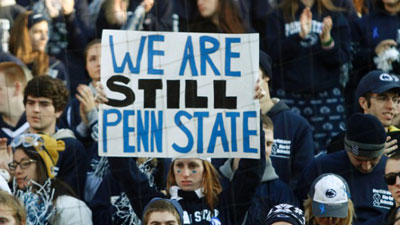Page 1 Page 2 Page 3 Page 4 Page 5

But of course the problem, if one bothers to take the time to consider it, is that punishment by association encourages a mindset, incites it even, of guilt by association. I knew that personally I could live with the sanctions. Easily. But what the NCAA had done was give tacit approval to those who insisted on pigeonholing all of Penn State. They legitimized it. That was the real sanction. And when they said it wasn’t about football, they were more right than they knew. It will take generations before Penn State University is thought of by most Americans without the accompanying specter of child abuse. The NCAA has made certain of that.
There was a picture on the front page of the Centre Daily Times, the town’s newspaper, the day after the head of the NCAA gutted the football program. Students – some of the Yale professor’s collateral damage – were sitting in the student union building watching the announcement. It was a photo full of young, fresh faces, all with expressions of bewilderment, many close to tears. And I knew that what they were feeling had nothing to do with football, but everything to do with the education they were now getting at the hands of their elders, more education than those college students bargained for, about how the world really works. And I wondered how they were going to get past that without getting swallowed by the cynicism. I wondered if they could heal from it.
Strangely, my love for the university and for the town of State College only grew as the summer days progressed. The area is, indeed, a part of my identity. It’s a part of my past and will continue to be a part of my future and I feel it deep inside. I went from wondering about the rationale for this type of feeling to embracing it in a few short weeks. Nothing crystallizes one’s thinking like coming under attack for your love of something.
But I won’t make the mistake the mob did and the NCAA multiplied. I won’t go into the “us” or “them” camp. And I won’t let my appreciation for my alma mater, no matter how freshly intensified, serve as surrogate for that which I know I need to earn on my own. But I can proclaim my allegiance as a way to proudly support the people of the town and the school. I know now, more than ever, that I have a real connection to them. I can be in sympathy with them. I know how they feel. Or rather, I should say, I know something of how most of the individuals that make up the town and the school, alumni included, feel. There are many of us who had a lot in common before the scandal broke. We have a lot more in common now. And if we find our own little ways of acknowledging that to each other, or showing our proud allegiance to our university in front of others – whether it’s with a t-shirt or a bumper sticker or a million-dollar donation to the library – it doesn’t necessarily mean we’re trying to separate. It might just mean we’re trying to say that we’re a part of something that’s bigger than our individual selves (and better than the NCAA would have you believe).
It’s the difference, really, between associating as a way to acquire identity (essentially a selfish act) and associating as a way to offer something of oneself to a larger cause (essentially a giving act). If the former can be divisive, the latter can be unifying, even redeeming. Maybe, as I think about those students in the union building, even healing.
On the last night of my summer in State College, I attended another State College Spikes game. The night was beautiful, warm with a gentle breeze, and I ate hot dogs and drank a couple of beers and cheered with the crowd for the Spikes. In the distance, a straight shot from center field, Mount Nittany sat as majestic as ever. Behind me was Beaver Stadium, where crowds of over 100,000 had watched roughly half of those 112 non-games. I noticed that many of the people at the baseball game were wearing Penn State caps and shirts. I didn’t wonder at the reason. For a few hours we could forget the problems of the university, forget about the angry mob, forget about what many on the outside thought about us. In the ballpark that night I didn’t feel the heaviness that I’d been feeling around town and campus. And the Spikes won, a 5-1 victory over another minor league team from another small town somewhere. It felt good to see State College win one.

